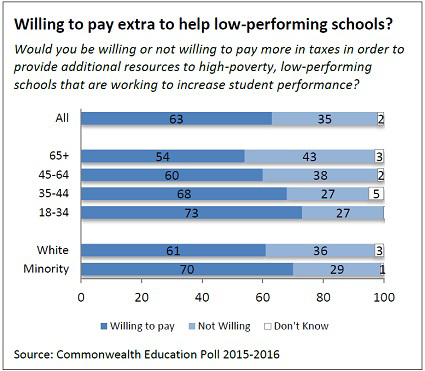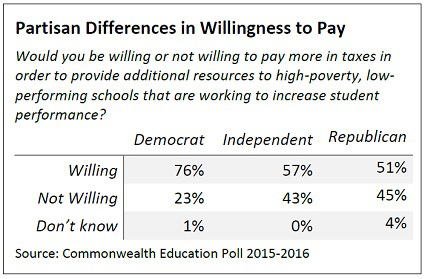 |
| State & Local Education News |
Virginia Senate downs measure on creating alternative schools
Washington Times
February 15, 2016
A two-year effort to expand charter schools in Virginia was dealt a blow Monday, when the Senate voted 21-19 to reject a measure that would have made it easier to establish alternative schools.
Republican Sens. A. Benton Chafin Jr. of Bland County and Emmett Hanger of Rockingham County joined the Democrats to kill a November ballot initiative for a constitutional amendment authorizing the Virginia Board of Education to approve charter schools.
Currently, local school boards have the power to establish charters in their districts but have been reluctant to do so: There are only nine charter schools in the state.
Sen. Mark Obenshain, Harrisonburg Republican, has pushed for charter schools for two years, calling them a “lifeline” for students who live in areas with lower-quality schools.
General Assembly bill looks to curb testing culture in Virginia's schools
The Virginian-Pilot
February 16, 2016
A bill moving through the General Assembly could help curb what its sponsor sees as excessive testing of students in Virginia.
State Sen. John Miller, a Democrat whose district includes part of the Peninsula, is sponsoring SB336, which would alter high school graduation requirements. It would remove provisions related to standard and advanced studies diplomas and require the state Board of Education to work with school and community leaders to set up a “Profile of a Virginia Graduate.”
The profile would stress the ability to think critically and creatively, communicate with others, work collaboratively and show good citizenship. The focus would be on college and career readiness.
The bill passed the Senate on Feb. 9 by a 40-0 vote and has moved to the House of Delegates Education Committee. Miller said he thinks it is important because of the emphasis on critical thinking.
Virginia's education chief Holton talks budget, Norfolk schools and her time in office
The Virginian-Pilot
February 14, 2016
Public education stands poised for a significant funding boost under Gov. Terry McAuliffe’s budget proposal. Lawmakers in the General Assembly already have begun to dissect some of the initiatives that seek to invest $1 billion, over two years, in public kindergarten through 12th grade, as well as higher education.
Anne Holton, Virginia’s education secretary, recently spoke with The Pilot about how the spending plan can help advance education in the state.
Holton, appointed by McAuliffe two years ago, said the budget would boost school funding to pre-2008 recession levels. Cuts in recent years have contributed to inequities in education spending, she said. “We’ve had an exacerbation of the haves and have-nots.”
|
National & Federal Education News
|
Where Are the Minority Professors?
The Chronicle of Higher Education
February 14, 2016
An examination of the demographics of more than 400,000 professors at 1,500 colleges shows where those of each rank, gender, race/ethnicity, and tenure status can be found.
On average, 75 out of every 100 full-time faculty members at four-year colleges are white. Five are black, and even fewer are Hispanic. But that’s not the whole story. Among the higher ranks and at certain types of institutions — say, small, private master’s universities — the faculty is even less diverse.
Using the drop-down menus, you can find the racial and ethnic breakdowns of all types of professors and institutions. Click the bars to see which colleges employ the most faculty members in each group.
|
|
|
Is the public willing to pay higher taxes to support schools with a large percentage of low income students?
Repeated studies have shown that there are unique challenges to providing high quality education in high-poverty environments. An interesting question is whether the public is willing to pay more in taxes in order to provide additional resources to high-poverty, low-performing schools that are working to increase student performance.
We asked that question in our poll for the first time this year. A majority (63%) of respondents would be willing to pay more in taxes to do so (see chart below). This compares to the 56% of the population that our poll found were willing to pay higher taxes in order to increase school funding overall. So a specific focus on high-poverty, low-performing schools working to increase performance resulted in 7% more people being willing to see their taxes raised.
 |
|
There was significant variability between different demographic groups in terms of their willingness to see their taxes raised in order to channel more funds to high-poverty, low-performing schools. For example, younger respondents were more likely to support additional resources. Among 18-34 year-olds, almost three-quarters (73%) were willing to pay more in taxes, while that proportion dropped to 68% among 35-44 year-olds, 60% among 45-64 year-olds and 54% among those 65 or older.
Likewise, minority respondents (70%) and Democrats (76%) were more likely than whites (61%) and Independents (57%) and Republicans (51%) to be willing to pay more in taxes to increase resources flowing to high-poverty, low-performing schools. Alongside these differences, it's also important to note that a majority of any of these breakdowns (age, race/ethnicity, partisan identity) would be willing to pay more in taxes to channel additional resources to such schools.
 |
|
(To read the full results of the 2016 Education Poll, visit our
website. Question 7 is the question reported above - detailed results are on page 49.)
Also check out David Blount's summary of education related legislative action during the 5th week of the General Assembly session.
We hope you have a great week!
Sincerely,
CEPI
|
General Assembly Update - Week 5
Excerpted from CEPI's
General Assembly Update, written by Policy Analyst David Blount. The update will be published weekly during the General Assembly session.
"Overview/Budget Issues
The General Assembly is racing toward Tuesday’s “crossover” deadline, when all bills must be cleared from their chamber of origin. The House and Senate expect to have long floor sessions the first of next week to finish action on bills and send them to the other chamber. Many complex and sometimes controversial bills still must be debated and discussed.
Money committee members in the House and Senate are shaping their respective spending plans behind the scenes in the coming week. They now have updated state revenue information, as the Secretary of Finance reported on Thursday that total general fund revenue collections rose 6.6 percent in January. The growth was due in large part to payroll withholding, individual estimated payments and fewer individual refunds being issued. On a fiscal year-to-date basis, total revenue collections have risen 2.4 percent through January, lagging the revised annual forecast of 3.2 percent growth. Collections of payroll and sales taxes, along with corporate income taxes, all are behind estimates for the fiscal year, while non-withholding collections are beating projections. Budget writers will use the updated information in shaping their changes to Governor McAuliffe’s introduced budget. They remain cautious about where revenues are trending as they prepare FY17 and FY18 proposals for their February 21 deadline.
Click
here for additional information about Governor McAuliffe's proposed changes to the public education budget for the remainder of FY16; and
here for the proposed FY17/FY18 education budget.
Education Legislation
After considerable delay, both chambers finally are taking up proposed charter schools referenda. The legislation provides for a referendum at the November election on whether to grant the Board of Education (BOE) the authority to establish charter schools within local school divisions. On a narrow 52 to 47 vote on Friday, the House approved
HJ 1. The corresponding enabling legislation to facilitate the referendum being placed on the ballot,
HB 3, received preliminary approval. The Senate is slated to consider its referenda and enabling bills,
SJ 6 and
SB 588, on Monday.
On a related note, the House also spent considerable time on Friday debating
HB 565. The bill makes several changes to the charter schools law that would be tied to approval of the referenda, namely providing for BOE approval of a charter school application denied by a local school board. The BOE could approve no more than five applications per year. An amendment was added on the floor that stipulates that either the State or the charter school applicant would pay for the construction of such charter school. The patron of the legislation pleaded with his colleagues that “public schools have nothing to fear from a little competition and all to learn from it.” Opponents argued that the General Assembly should not allow a state appointed board to bypass the wishes of a local elected board. The bill received preliminary approval. Its Senate counterpart,
SB 734, is on the Senate floor for debate next week."
(To read the full update, visit our
website.)
|
|
